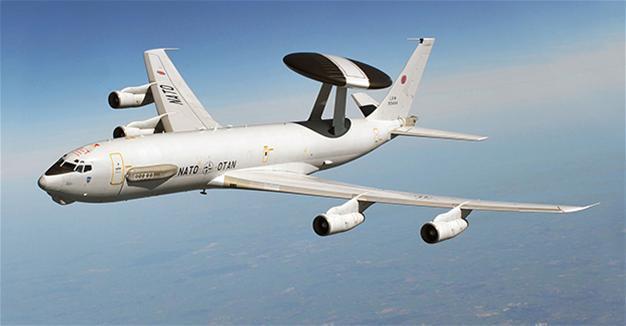NATO plans to deploy AWACS in October
Serkan Demirtaş - BRUSSELS
 NATO is planning to deploy surveillance aircrafts to support the international coalition’s ongoing fight against the Islamic State of Iraq and the Levant (ISIL) before the end of October, a senior official has said.
NATO is planning to deploy surveillance aircrafts to support the international coalition’s ongoing fight against the Islamic State of Iraq and the Levant (ISIL) before the end of October, a senior official has said.“The operations of the AWACS [NATO’s Airborne Warning and Control System] have not yet begun. But I hope they will begin next month,” Alexander Vershbow, NATO’s deputy secretary-general, told a group of international reporters at a briefing at the alliance’s headquarters on Sept. 26.
NATO had decided to provide air surveillance support for the ongoing anti-ISIL fight by the United States-led coalition at the Warsaw Summit in early July. In line with the decision NATO’s AWACS will be deployed, Vershbow said, without detailing how many aircrafts would be dispatched and where they would operate from.
Vershbow said some military personnel from allied countries needed to operate as part of the AWACS mission and governments should get the necessary approvals from their parliaments. “I hope this will be completed within weeks. We have a defense ministers meeting at the end of October. I think this will be completed by that time,” he said.
The timetable of the deployment of AWACS coincided with projected operations by the anti-ISIL coalition against Mosul and Raqqa, two ISIL strongholds, in Iraq and Syria.
NATO had deployed AWACS to one of its Forward Operating Bases (FOB) in the Central Anatolian province of Konya in early 2016 in a bid to enhance Turkey’s air defense capability upon the Turkish government’s call. It was not yet decided whether the AWACS will be deployed to Konya but Vershbow said, “They will either use Turkish airspace or international airspace,” indicating they wouldn’t fly over Syrian or Iraqi airspace.
The scope of the AWACS mission will be limited to air surveillance and they will not take part in “battle management,” Vershbow stated, recalling this was a mutual decision of the allies. “They will provide additional data to coalition operations,” he added.
Although all NATO countries are members of the anti-ISIL coalition, the alliance itself is not directly taking part in efforts as an institution, he said, however adding both upgrading the air surveillance capacity of the coalition countries and training the Iraqi military were initiatives NATO had been undertaking as part of this global endeavor.
NATO launched a training program for the Iraqi military in Jordan early this year but however decided to further increase the capability of the Iraqi army through a new training initiative, this time inside Iraq, Vershbow said.
NATO had decided to provide air surveillance support for the ongoing anti-ISIL fight by the United States-led coalition at the Warsaw Summit in early July. In line with the decision NATO’s AWACS will be deployed, Vershbow said, without detailing how many aircrafts would be dispatched and where they would operate from.
Vershbow said some military personnel from allied countries needed to operate as part of the AWACS mission and governments should get the necessary approvals from their parliaments. “I hope this will be completed within weeks. We have a defense ministers meeting at the end of October. I think this will be completed by that time,” he said.
The timetable of the deployment of AWACS coincided with projected operations by the anti-ISIL coalition against Mosul and Raqqa, two ISIL strongholds, in Iraq and Syria.
NATO had deployed AWACS to one of its Forward Operating Bases (FOB) in the Central Anatolian province of Konya in early 2016 in a bid to enhance Turkey’s air defense capability upon the Turkish government’s call. It was not yet decided whether the AWACS will be deployed to Konya but Vershbow said, “They will either use Turkish airspace or international airspace,” indicating they wouldn’t fly over Syrian or Iraqi airspace.
The scope of the AWACS mission will be limited to air surveillance and they will not take part in “battle management,” Vershbow stated, recalling this was a mutual decision of the allies. “They will provide additional data to coalition operations,” he added.
Although all NATO countries are members of the anti-ISIL coalition, the alliance itself is not directly taking part in efforts as an institution, he said, however adding both upgrading the air surveillance capacity of the coalition countries and training the Iraqi military were initiatives NATO had been undertaking as part of this global endeavor.
NATO launched a training program for the Iraqi military in Jordan early this year but however decided to further increase the capability of the Iraqi army through a new training initiative, this time inside Iraq, Vershbow said.
















